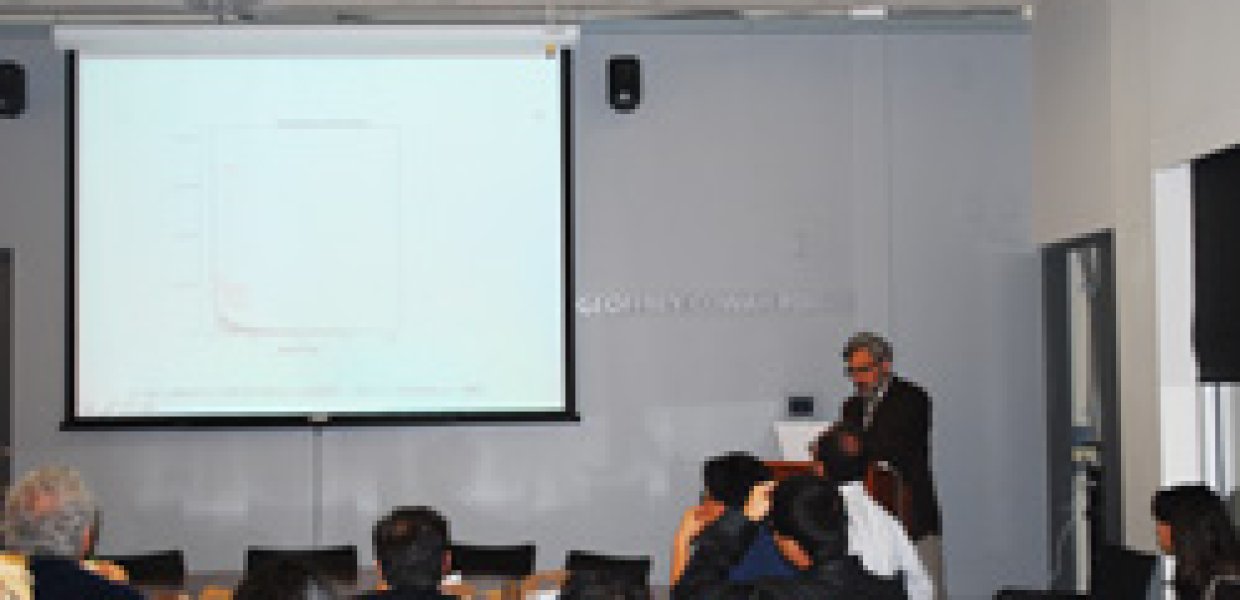 At the Oct. 24 Annenberg Research Seminar, George A. Barnett demonstrated how telecommunication research can use social science communication theory to study the changing structure of the global community. Barnett, a communication professor at UC Davis, traced two decades of global communication in his presentation: “The Global Telecommunication Network and Cultural Convergence.” His presentation began with an explanation of his 1978-2009 study of the international telecommunication network. The study used measurements of millions of minutes of telephone time between pairs of countries for 31 points in time between 1978-2009. According to this research, the most central nodes of communication were the United States, the United Kingdom, Canada, Germany and Mexico. Barnett's research on international telephone communication shows that the network became more centralized around 16 core countries. This data traced the gradual increase of international communication with India and China. These statistics reflect the growth of these countries' global significance. Barnett said the findings of quantitative studies such as this should be applied to a combination of theories to bring greater understanding to global communication. He said, however, that now that Skype has become the largest provider of cross-border voice communication, measuring international Internet communication is the proper way to calculate the extent of international communication today. Therefore, Barnett started conducting studies such as one that looked at 550 million websites and 356 million hyperlinks and their country of origin/destination to calculate the density of international connections on the Web. He said international hyperlinks have grown exponentially since 1998, from 9 billion in 2009 to 14 billion in 2010. Barnett's findings showed that "all international Internet structurally flows through the United States." The United States, along with a few other countries such as the UK and China, are at the core of global communication. By applying communication theory, Barnett said this data supports the power of imperialism as defined by Galtung's Structural Theory as well as The World System Theory. "The stronger the link between actors, the greater their reciprocal influence, the faster they converge on beliefs," he said, adding this means that the density of communication in these countries is leading to globalization and cultural convergence centered around the cultural influences of these countries. George A. Barnett
At the Oct. 24 Annenberg Research Seminar, George A. Barnett demonstrated how telecommunication research can use social science communication theory to study the changing structure of the global community. Barnett, a communication professor at UC Davis, traced two decades of global communication in his presentation: “The Global Telecommunication Network and Cultural Convergence.” His presentation began with an explanation of his 1978-2009 study of the international telecommunication network. The study used measurements of millions of minutes of telephone time between pairs of countries for 31 points in time between 1978-2009. According to this research, the most central nodes of communication were the United States, the United Kingdom, Canada, Germany and Mexico. Barnett's research on international telephone communication shows that the network became more centralized around 16 core countries. This data traced the gradual increase of international communication with India and China. These statistics reflect the growth of these countries' global significance. Barnett said the findings of quantitative studies such as this should be applied to a combination of theories to bring greater understanding to global communication. He said, however, that now that Skype has become the largest provider of cross-border voice communication, measuring international Internet communication is the proper way to calculate the extent of international communication today. Therefore, Barnett started conducting studies such as one that looked at 550 million websites and 356 million hyperlinks and their country of origin/destination to calculate the density of international connections on the Web. He said international hyperlinks have grown exponentially since 1998, from 9 billion in 2009 to 14 billion in 2010. Barnett's findings showed that "all international Internet structurally flows through the United States." The United States, along with a few other countries such as the UK and China, are at the core of global communication. By applying communication theory, Barnett said this data supports the power of imperialism as defined by Galtung's Structural Theory as well as The World System Theory. "The stronger the link between actors, the greater their reciprocal influence, the faster they converge on beliefs," he said, adding this means that the density of communication in these countries is leading to globalization and cultural convergence centered around the cultural influences of these countries. George A. Barnett
UC Davis professor discusses global telecommunication at Annenberg Research Seminar
October 24, 2011
Updated May 1, 2023 12:28 p.m.


